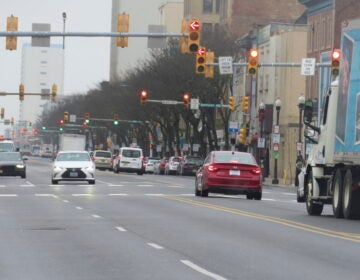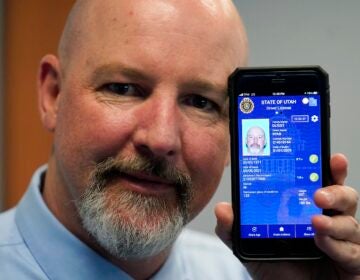New Jersey rolls out Real ID driver’s licenses on appointment-only basis
Starting October 2020, standard licenses will no longer work at airport security checkpoints or to enter federal buildings.

Cars and trucks are shown jammed on the southbound New Jersey Turnpike. (Mel Evans/AP Photo)
New Jersey is finally rolling out Real ID driver’s licenses, about a year before an October 2020 deadline, when standard licenses will no longer work at airport security checkpoints or to enter federal buildings.
The new cards meet federal security standards passed after 9/11 and require even more documentation than New Jersey’s current 6-point identification system. But they are not mandatory, and travelers can still use passports or other federal IDs for air travel.
Standard driver’s licenses, meanwhile, will still be valid for driving and most identification purposes.
New Jersey is one of the last states to implement the federally mandated program. For now, the licenses are available only by appointment at select locations throughout the state.
The way to sign up, and to learn more about the Real ID requirements, is by visiting realidnj.com.
More than 66,000 of New Jersey’s six million drivers have already done so, said Sue Fulton, chief administrator of the state Motor Vehicle Commission.
She said appointments will be offered starting next week to residents near the MVC’s Trenton facility, which is “fully operational,” and five other undisclosed agencies throughout the state that are still in the testing phase.
Few appointments will be available at first, she said, and they could last 45 minutes or longer. But as more agencies come online and workers gain familiarity with the process, appointments will be faster and available to more people.
“By Thanksgiving, everyone will be within the range of at least a testing agency, if not a fully operational agency to be able to get an appointment,” she said.
Unlike standard New Jersey driver’s licenses, which require six points of identification, Real ID licenses follow a more stringent formula: 2 + 1 + 6, or two proofs of address, one proof of Social Security number, and six points of ID. Originals, not copies or computer printouts, are required for many documents.
Lynn Cummings, 72, of Pennsauken, predicted many people would have difficulty gathering the necessary paperwork based on her experience trying to renew her license after New Jersey adopted its 6-point system in 2003.
Born Helen but referred to as Lynn her whole life, she discovered the name on her birth certificate differed from that on her passport and marriage certificate — leaving her unable to clear the 6-point hurdle.
After weeks of frustration, she and her husband settled on an unorthodox solution: getting married a second time in a different state to generate a new marriage certificate. It worked. Decades after getting married in a church ceremony, a local official married them in their backyard and the new certificate cleared the way for a renewed license.
“I might be become a consultant to help them get through it,” she said of the new crop of Real ID-seekers. “I might have people getting married all over the place.”
New Jersey’s implementation of the Real ID was delayed by litigation and the need to replace technology that couldn’t handle the increased demands of processing Real ID applications.
But Fulton says the delays allowed New Jersey to learn from other states and improve customer service beyond Real ID applications. In addition to hiring 300 workers to help with Real ID, the MVC updated its systems for queuing, payment and appointments and made more services available online.
“Our priority is to make sure that every New Jerseyan who needs a Real ID is able to get one before they need it,” Fulton said.
WHYY is your source for fact-based, in-depth journalism and information. As a nonprofit organization, we rely on financial support from readers like you. Please give today.





